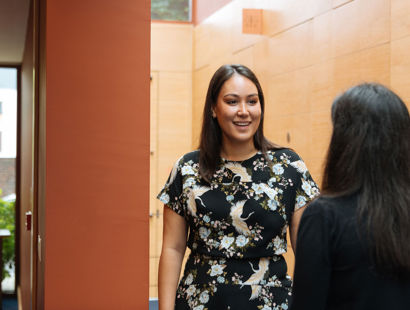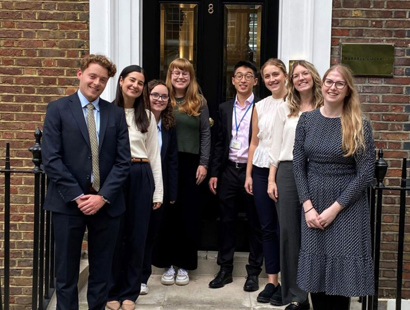
Reflections on my experience of mediation: top tips for applicants
First-seat trainee Holly Robinson shares the top tips she has gleaned from her experience in mediation as part of the property litigation team.
My first few weeks at Russell-Cooke were a whirlwind; I received my SQE 2 results in late August 2024 and a mere four days later, I found myself in new city, moved into a new flat, and beginning my training contract in the property litigation team.
Despite being merely a month into my seat, I had the opportunity to shadow a mediator during a mediation for a commercial dilapidations dispute. I think this is a real testament to the firm’s investment in their talent and commitment to professional and personal development. This was a rare opportunity to peer beyond the usual experience of mediation and one which remains a highlight of my first seat thus far.
My experience of mediation
The mediator, as the impartial third party, usually greets either side of the meeting room before the respective sides separate into their private rooms for the day.
The usual way in which a trainee might be involved in a mediation is to be present with the client in the private room, ultimately taking notes of the progress of the day and observing the process as it unfolds.
Instead, I shadowed the mediator as he navigated between the parties present, observing how the mediator deployed various strategies to maximise the chances of coming to an agreement.
Although the parties did not resolve their dispute on the day (leaving this hopeful newbie trainee somewhat deflated), the experience taught me valuable lessons which are applicable to those applying for a training contract and to day-to-day life as a trainee. I’ve come to appreciate how the skills I observed are as crucial in mediation as they are in building a successful legal career.
Trainee take-aways
1. Prepare, prepare, prepare
‘Fail to prepare, prepare to fail’ is thrown around a lot but it holds truth. The mediator prepared extensively; by understanding the context of the dispute, the people involved, and the potential sticking points, he was well equipped for the twists and turns of the day.
Research thoroughly and reflect deeply when preparing for the various stages of the application. Use all available resources to anticipate questions, develop insightful responses, and connect your past experiences to the role.
2. Temper your preparation with flexibility and confidence
The mediator was adept at responding to the present. Despite his extensive preparation, he was adaptable and composed when entering new territory.
Be wary of over-reliance on preparation. Trust in your abilities and accumulated knowledge to overcome fear of the unknown. Remind yourself that you are relying on the knowledge you have accumulated which will help you navigate new challenges confidently.
3. Let your experience guide you
At one point, the mediator recognised that the parties were unlikely to reach an agreement on the current trajectory. Relying on his extensive experience, he shifted tactics before fatigue and frustration set in and were able to derail the mediation.
Experience comes in many forms, all of which can be remoulded and relevant when making your application. Reflect on how personal, professional and academic experience shapes your instincts and informs your decisions. Trust your ‘gut feeling’ when it’s rooted in past learning!
4. Actively listen, read the room, respond thoughtfully
The mediator’s exceptional listening skills enabled him to identify not just what was said but how it was said, identifying underlying concerns and emotions. The mediator’s skilful questioning unearthed hidden motivations and reframed issues in ways that encouraged cooperation.
At interview, listen with intent and be aware of the underlying skills and characteristics for which the interviewer might be looking.
5. Managing emotions (theirs and yours!)
The mediator deftly acknowledged and validated strong emotions, defusing tensions and allowing the cathartic nature of the process to unfold in private. He also regulated his emotions to avoid bias and translated the tone and language of one party to another. For instance, a strongly worded statement from one side might be softened to highlight its core concerns whilst removing inflammatory language, encouraging constructive dialogue.
In stressful situations, try to remain composed under pressure and practice techniques to de-escalate overly emotional responses. During an interview or a table discussion, take a moment to compose yourself before responding to new or challenging information. This will help to ensure your points are clear and considered.
6. Body language can speak louder than words
The mediator’s open, welcoming gestures and posture set the parties at ease, reaffirming his impartial position. He tailored his approach to the personalities and communication styles of each party.
In an interview or table discussion setting, be mindful of your non-verbal cues. Align your body language with the message you wish to convey. Friendliness and approachability goes a long way, especially at a firm like Russell-Cooke where our culture is at the heart of what we do.
Holly Robinson is a first-seat trainee in the property litigation team.
Applications for our 2027 training contract and 2025 vacation scheme open on 8 November 2024 and close on 7 February 2025.
Get in touch
Visit our graduate recruitment portal for further information on our training contracts and vacation scheme.




